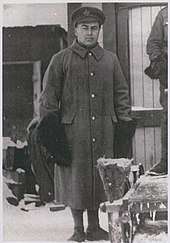Monteith POW camp
The POW Camp 23, Monteith was a Canadian-run POW camp during World War II, located in Monteith, Iroquois Falls, Ontario.

History
Before World War II, the camp was a lumber camp employing about 40 men. Board lumber was cut on site and shipped about 8 km to the rail line. [source? This is inconsistent with the camp being the Monteith Correctional Centre, starting in 1938.]
In July 1940, the camp was converted into POW Camp Q, later called Camp 23, by the Canadian government.[1][2] The camp had a maximum capacity of 4000.[3] The prisoners included interned German nationals in addition to captured German soldiers. The German national internees, as distinct from prisoners of war, had largely been classified as "enemy aliens", many shipped from Britain after the fall of France in 1940 under Churchill's "collar the lot" edict. As most of these were in fact Jewish or political refugees from the Nazi regime (and so would have formally had their German citizenship withdrawn by the authorities there, thus being effectively stateless, even if this factor was not realised or recognised in the UK), after vetting many were allowed to return to Britain to join the armed forces.[4]
One such interned German national was Wulff Scherchen, the 20-year old son of the German conductor Hermann Scherchen, who was living in Cambridge when he was arrested in 1940 and shipped to Canada. Wulff Scherchen was the romantic interest of Benjamin Britten, himself only 26 at the time. Many of his letters to Britten from Camp Q (POW Camp 23) survive. Over 80 years later, with his consent, these heartfelt letters were made into an orchestral song cycle called Serenade for Tenor, Saxophone and Orchestra by composer Lyle Chan.[5]
The camp ceased operating as a military POW camp in 1946[6] and became a provincial reformatory known today as the Monteith Correctional Complex.
References
- Helmer, Paul (22 June 2014). "Growing with Canada: The Émigré Tradition in Canadian Music". McGill-Queen's Press - MQUP – via Google Books.
- Zimmermann, Ernest Robert (15 December 2015). "The Little Third Reich on Lake Superior: A History of Canadian Internment Camp R". University of Alberta – via Google Books.
- "Former Hinton history buff tells POW camp tale". hintonparklander.com.
- Elwell, Paul. "Paul Elwell's Story - Part 2- War and Internment". BBC - WW2 People's War.
- "Britten's letters with a teenage muse become a new song cycle". www.limelightmagazine.com.au. Retrieved 2017-03-17.
- Melady, John (1 January 1981). "Escape from Canada!: The Untold Story of German POWs in Canada, 1939-1945". Macmillan of Canada – via Google Books.
External links
- Hans Höchersteiger papers, Division of Special Collections, University of Alabama Libraries. Höchersteiger was a prisoner here. See 'Correspondence, Outgoing - POW letters and postcards,' which contains 17 items in German.